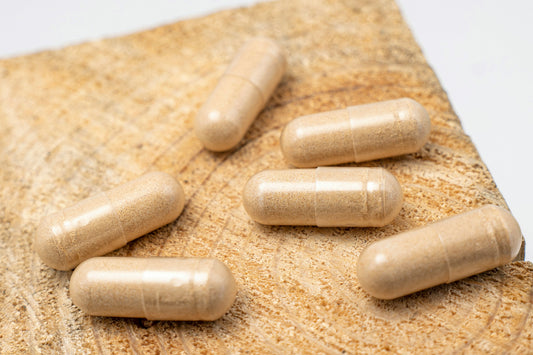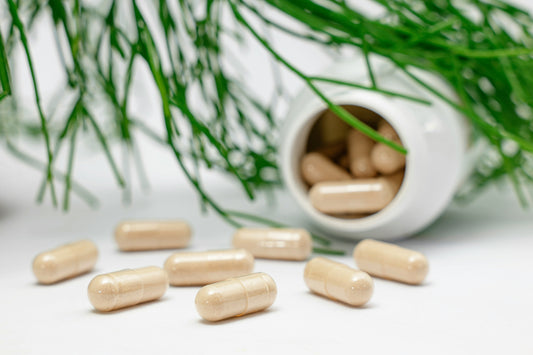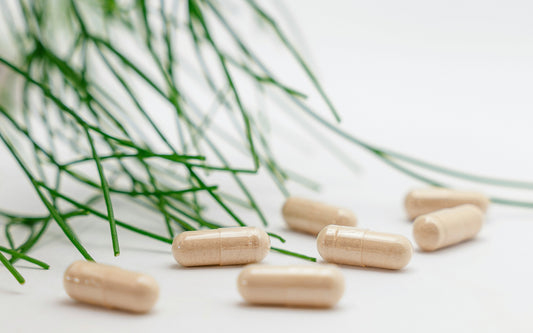Does Green Tea Leaf Lower Blood Pressure?
Green tea has long been praised for its numerous health benefits, but can it actually help lower blood pressure? Several studies have investigated the effect of green tea consumption on blood pressure, with inconsistent results. However, a meta-analysis of randomized controlled trials found that green tea consumption significantly decreased systolic blood pressure (SBP) and diastolic blood pressure (DBP) levels. This suggests that green tea may have a favorable effect on blood pressure. Let's explore the potential benefits of green tea and its role as a natural remedy for hypertension.

- Green tea consumption has been found to significantly decrease systolic and diastolic blood pressure levels.
- Other types of tea, such as dark tea, sweet tea, and scented tea, may also have a positive effect on blood pressure.
- Further research is needed to fully understand the relationship between tea consumption and blood pressure control.
- Green tea is a natural remedy that may complement other lifestyle changes in managing hypertension.
- Regular consumption of green tea and other types of tea may offer potential benefits for cardiovascular health.
The Benefits of Green Tea
Green tea is known for its rich antioxidant content and has been associated with numerous health benefits, including positive effects on cardiovascular health and blood pressure regulation. Antioxidants help protect the body from damage caused by free radicals, which are unstable molecules that can contribute to chronic diseases and aging. The catechins found in green tea are a type of antioxidant that have been studied for their potential health-promoting properties.
One area of interest is the impact of green tea on cardiovascular health. Research suggests that drinking green tea regularly may help lower the risk of developing heart disease and stroke. Studies have shown that green tea consumption is associated with lower levels of total cholesterol, LDL cholesterol (the "bad" cholesterol), and triglycerides. These factors are known to contribute to the development of cardiovascular diseases and high blood pressure.
When it comes to blood pressure regulation, several studies have investigated the effects of green tea consumption. A meta-analysis of randomized controlled trials found that green tea consumption significantly decreased systolic blood pressure (SBP) and diastolic blood pressure (DBP) levels. Another study found that drinking green tea was associated with a reduced risk of hypertensive blood pressure and a slight reduction in SBP. These findings indicate that green tea may have a beneficial impact on blood pressure management.

In addition to green tea, other types of tea have also been studied for their effects on blood pressure. One study found that dark tea, sweet tea, and scented tea consumption were associated with lower SBP. However, the effect of tea consumption on blood pressure during regular consumption was not significant. These findings suggest that the benefits of tea consumption on blood pressure may vary depending on the type of tea and the frequency of consumption.
In conclusion, green tea is a beverage that offers potential health benefits, including positive effects on cardiovascular health and blood pressure regulation. While the research on the relationship between green tea consumption and blood pressure is still evolving, studies indicate that green tea may have a favorable impact on blood pressure levels. However, it is important to note that individual results may vary, and more research is needed to fully understand the relationship between green tea and blood pressure.
Research on Green Tea and Blood Pressure
Numerous studies have examined the impact of green tea consumption on blood pressure levels, providing valuable insights into its potential as a natural remedy for high blood pressure. These studies have revealed both positive and inconclusive results, indicating the need for further research to fully understand the relationship between green tea and blood pressure control.
A meta-analysis of randomized controlled trials, published in the Journal of the American College of Nutrition, found that green tea consumption significantly decreased both systolic blood pressure (SBP) and diastolic blood pressure (DBP) levels. The analysis included studies that investigated the effects of green tea extract, as well as studies that assessed the impact of consuming green tea as a beverage. The findings indicated that regular green tea consumption may have a favorable effect on blood pressure levels.
Other studies have also explored the effects of different types of tea on blood pressure. One study, published in the Journal of Hypertension, found that drinking green tea was associated with a reduced risk of hypertensive blood pressure and a slight reduction in SBP. Additionally, a study conducted by researchers at the Chinese Academy of Sciences found that consumption of dark tea, sweet tea, and scented tea was also associated with lower SBP. However, the effect of tea consumption on blood pressure during regular consumption was not found to be significant.
While these findings suggest that green tea and other types of tea may have potential benefits for blood pressure control, it is important to note that the results of individual studies have been varied. The relationship between tea consumption and blood pressure is complex and may be influenced by various factors such as the type of tea, dosage, and duration of consumption. Therefore, more research is needed to fully understand the mechanisms underlying the potential benefits of tea on blood pressure control.
If you are interested in trying a natural approach to managing your blood pressure, Nutrigrove Blood Pressure Support can be a helpful supplement to consider. This supplement is formulated with a blend of natural ingredients, including green tea leaf extracts, that has been shown to support healthy blood pressure levels.
| Study | Results |
|---|---|
| Meta-analysis of randomized controlled trials | Significant decrease in both systolic and diastolic blood pressure levels with green tea consumption |
| Study on green tea consumption | Reduced risk of hypertensive blood pressure and slight decrease in systolic blood pressure |
| Study on different types of tea consumption | Association between dark tea, sweet tea, and scented tea consumption with lower systolic blood pressure |
The Effectiveness of Green Tea in Lowering Blood Pressure
While the results of studies investigating the effectiveness of green tea in lowering blood pressure have been inconsistent, some research suggests a potential positive impact. A meta-analysis of randomized controlled trials, which examined the collective data from multiple studies, found that green tea consumption significantly decreased both systolic blood pressure (SBP) and diastolic blood pressure (DBP) levels.
"A meta-analysis of randomized controlled trials found that green tea consumption significantly decreased systolic blood pressure and diastolic blood pressure levels."
Furthermore, other studies have explored the effects of different types of tea consumption on blood pressure. One study found that drinking green tea was associated with a reduced risk of hypertensive blood pressure and a slight reduction in SBP. Another study discovered that dark tea, sweet tea, and scented tea consumption were also associated with lower SBP.
However, it is important to note that the effect of tea consumption on blood pressure during regular consumption was not found to be significant. While there is evidence to suggest that green tea and other types of tea may have a favorable effect on blood pressure, more research is needed to fully understand the relationship and establish consistent findings.

- A meta-analysis of randomized controlled trials found that green tea consumption can significantly decrease systolic and diastolic blood pressure.
- Drinking green tea has been associated with a reduced risk of hypertensive blood pressure and a slight reduction in SBP.
- Other types of tea, such as dark tea, sweet tea, and scented tea, have also shown potential in lowering SBP.
- Regular tea consumption may not have a significant effect on blood pressure levels.
In conclusion, while the effectiveness of green tea in lowering blood pressure may vary across studies, there is evidence to suggest a positive impact. Further research is needed to fully understand the relationship between tea consumption and blood pressure control.
| Study | Findings |
|---|---|
| Meta-analysis of randomized controlled trials | Green tea consumption significantly decreased systolic and diastolic blood pressure levels. |
| Study on green tea and hypertensive blood pressure | Drinking green tea was associated with a reduced risk of hypertensive blood pressure and a slight reduction in SBP. |
| Study on various types of tea | Dark tea, sweet tea, and scented tea consumption were associated with lower SBP. |
| Study on regular tea consumption | Regular consumption of tea did not have a significant effect on blood pressure levels. |
Other Types of Tea and Blood Pressure
In addition to green tea, other types of tea, such as dark tea, sweet tea, and scented tea, have also been associated with potential benefits for blood pressure management. While green tea has received the most attention in research studies, these other varieties of tea should not be overlooked.
A study conducted by researchers found that drinking green tea was associated with a reduced risk of hypertensive blood pressure and a slight reduction in systolic blood pressure (SBP). This suggests that incorporating green tea into your daily routine may have a positive impact on blood pressure levels.
Furthermore, the same study showed that dark tea, sweet tea, and scented tea consumption were also associated with lower SBP. However, it's important to note that the effect of tea consumption on blood pressure during regular consumption was not significant. This means that while an occasional cup of these teas may offer some benefits, consistent and regular consumption is key to maximizing their potential effects.
| Type of Tea | Effect on Blood Pressure |
|---|---|
| Green Tea | Reduced risk of hypertensive blood pressure and slight reduction in SBP |
| Dark Tea | Associated with lower SBP |
| Sweet Tea | Associated with lower SBP |
| Scented Tea | Associated with lower SBP |
While the findings from these studies are promising, it's important to remember that more research is needed to fully understand the relationship between different types of tea and blood pressure management. Additionally, it's essential to consult with a healthcare professional before making any significant changes to your diet or lifestyle, especially if you have existing health conditions.

While the research on green tea's effect on blood pressure is promising, more studies are needed to fully understand its potential benefits and to establish it as a reliable natural remedy for hypertension. Several studies have investigated the effect of green tea consumption on blood pressure, and the results have been inconsistent. However, a meta-analysis of randomized controlled trials found that green tea consumption significantly decreased systolic blood pressure (SBP) and diastolic blood pressure (DBP) levels.
Other studies have also explored the effects of different types of tea consumption on blood pressure. One study found that drinking green tea was associated with a reduced risk of hypertensive blood pressure and a slight reduction in SBP. Another study found that dark tea, sweet tea, and scented tea consumption were also associated with lower SBP. However, the effect of tea consumption on blood pressure during regular consumption was not significant.
Overall, the evidence suggests that green tea and other types of tea may have a favorable effect on blood pressure, but more research is needed to fully understand the relationship. Future studies should explore the specific mechanisms by which green tea and other teas exert their blood pressure-lowering effects. Additionally, larger and more rigorous clinical trials are needed to establish the optimal dosage and duration of green tea consumption for blood pressure management.
FAQ
Does green tea leaf lower blood pressure?
Yes, several studies have shown that green tea consumption can lower blood pressure levels.
What are the benefits of green tea?
Green tea has numerous health benefits, including its potential to improve cardiovascular health and manage hypertension.
What does research say about green tea and blood pressure?
Research studies have found that green tea consumption is associated with decreased systolic and diastolic blood pressure levels.
How effective is green tea in lowering blood pressure?
Some studies have shown positive results in terms of green tea's ability to lower blood pressure, but more research is needed to fully understand its effectiveness.
Can other types of tea lower blood pressure?
Yes, studies have also found that other types of tea, such as dark tea, sweet tea, and scented tea, may have a favorable effect on blood pressure.
What is the conclusion regarding green tea and blood pressure?
Based on the current evidence, green tea and other types of tea may have a beneficial effect on blood pressure, but further research is necessary to fully understand the relationship.






